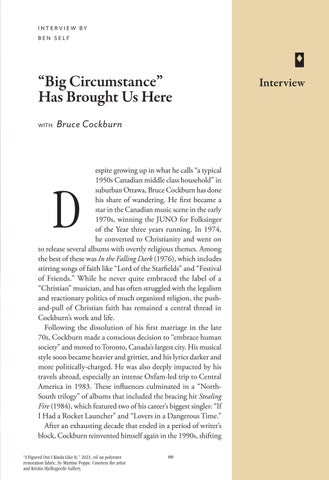INTERVIEW BY BEN SELF
“Big Circumstance” Has Brought Us Here WITH
Bruce Cockburn
espite growing up in what he calls “a typical 1950s Canadian middle class household” in suburban Ottawa, Bruce Cockburn has done his share of wandering. He first became a star in the Canadian music scene in the early 1970s, winning the JUNO for Folksinger of the Year three years running. In 1974, he converted to Christianity and went on to release several albums with overtly religious themes. Among the best of these was In the Falling Dark (1976), which includes stirring songs of faith like “Lord of the Starfields” and “Festival of Friends.” While he never quite embraced the label of a “Christian” musician, and has often struggled with the legalism and reactionary politics of much organized religion, the pushand-pull of Christian faith has remained a central thread in Cockburn’s work and life. Following the dissolution of his first marriage in the late 70s, Cockburn made a conscious decision to “embrace human society” and moved to Toronto, Canada’s largest city. His musical style soon became heavier and grittier, and his lyrics darker and more politically-charged. He was also deeply impacted by his travels abroad, especially an intense Oxfam-led trip to Central America in 1983. These influences culminated in a “NorthSouth trilogy” of albums that included the bracing hit Stealing Fire (1984), which featured two of his career’s biggest singles: “If I Had a Rocket Launcher” and “Lovers in a Dangerous Time.” After an exhausting decade that ended in a period of writer’s block, Cockburn reinvented himself again in the 1990s, shifting
D
“I Figured Out I Kinda Like It,” 2021, oil on polyester restoration fabric, by Martine Poppe. Courtesy the artist and Kristin Hjellegjerde Gallery.
101
Interview
